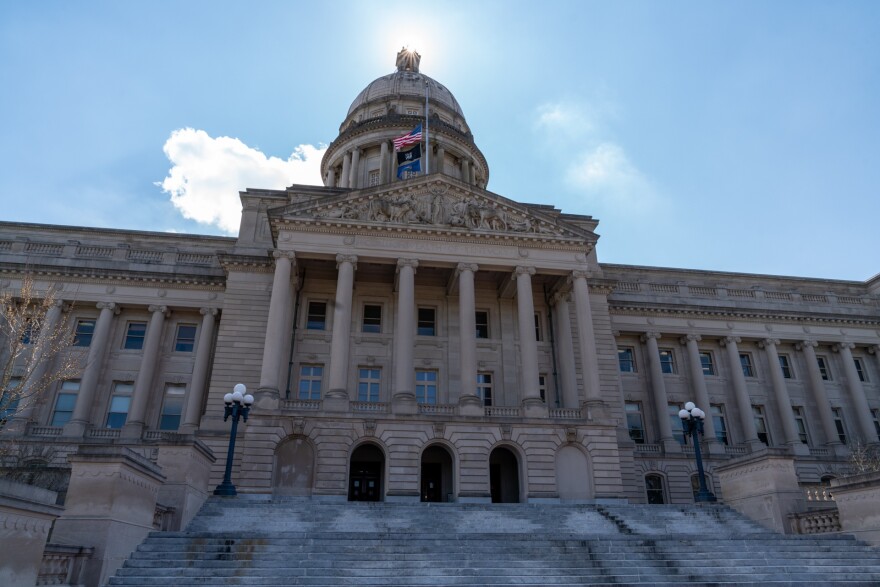Kentucky lawmakers wrapped up this year’s legislative session Thursday with some last-minute surprises: reviving bills that had been considered dead, adding measures to unrelated legislation and passing last-minute “cleanup” language.
The flurry of activity on the last day capped off a meaty 60-day session where the Republican-led legislature passed a new two-year state budget that invests more in state services than previous years, but doesn’t go as far as some advocates hoped.
On Wednesday, lawmakers overrode Democratic Gov. Andy Beshear’s vetoes of the budget, an expensive overhaul to the tax code, a major anti-abortion bill, a ban on trans athletes from girls sports and sweeping changes to the state’s education system including so-called “anti-critical race theory” provisions.
Earlier in the year, the legislature drew new political maps as part of the once-a-decade redistricting process, cut unemployment benefits and passed relief measures intended to help people affected by the deadly tornado outbreak in December.
During a press conference on Thursday, Beshear praised lawmakers for some of their actions during the session, like giving raises to state workers in the state budget, but he criticized them for what he called “meanness.”
“Some bills that were passed where they’re not addressing any real challenge,” Beshear said. “And some bills that are really going to harm people. The cuts to our safety net make us one of the least generous, stingiest, meanest states for those who’ve been knocked down.”
Since Republicans have about three-quarters of the seats in the legislature, there’s little Beshear can do to block bills. It takes only a majority of votes in each chamber to override a Kentucky governor’s veto.
Sean Southard, communications director for the Kentucky Republican Party, said the ease with which lawmakers overrode the governor’s vetoes showed how little influence he has in the legislature.
“By any way of measuring it, Governor Beshear is likely the most irrelevant policy governor in Kentucky's history,” Southard wrote in a statement.
Since Beshear took office in 2019, Republican lawmakers have slowly chipped away at the governor’s powers. Last year, upset with Beshear’s responseto the coronavirus pandemic, Republicans limited Beshear’s emergency orders to 30 days, unless renewed by lawmakers. This year, lawmakers continued the trend, forbidding the governor from using state funds to sue over laws passed by the legislature, and making the Republican state treasurer the final arbiter of state contracts.
Here’s some of what passed on the last day of this year’s legislative session. The next regular session begins on Jan. 3, 2023.
Library boards overhaul
In a surprise move, the legislature overrode Gov. Andy Beshear’s veto of Senate Bill 167, which gives county officials more control over local library boards.
Lawmakers initially failed to override Beshear’s veto Wednesday night, but the bill was revived Thursday afternoon after securing a handful of additional votes.
Supporters of the measure say library boards, which have taxing authority, should have more oversight from elected officials. But many local librarians worry the measure will bring politics into libraries’ finances, hiring practices and even which books end up on the shelves.
Bowling Green Democratic Representative Patti Minter said the bill will insert politics into how libraries are run.
“This one is going to be hard to put back in the bottle and you’re going to have to answer to your constituents who say ‘why did you mess up my library,’” Minter said.
In his veto message, Beshear said the bill threatens the “non-political nature of public library boards.”
The bill will not affect library systems in Louisville, Lexington and a handful of other cities.
“Fix” to penalties for how teachers talk about race, U.S. history
Republican lawmakers passed a “fix” to a sweeping education bill that passed into law on Wednesday, deleting language that would have created criminal penalties for teachers who don’t follow new restrictions on how they talk about race and U.S. history in the classroom.
The language was added to a separate bill advancing in the legislature, House Bill 44, which allows school districts to excuse student absences related to mental health.
Cannabis study
Though supporters hoped this would be the year the legislature passed a medical cannabis bill, conservatives leaders are still wary of the drug, and decided instead to study the issue further.
Lawmakers passed House Bill 604, which would establish the Kentucky Center for Cannabis Research at the University of Kentucky and fund it with $2 million.
Democratic Gov. Andy Beshear said earlier this week that if lawmakers don’t pass a medical cannabis bill he will “explore” options to legalize the drug by executive order.
That same bill also made changes to the state budget, including an additional $210 million for the pension fund for most state workers, according to Sen. Christian McDaniel, a Republican from Ryland Heights.
A second bill that would have legalized medical cannabis for Kentuckians with certain medical conditions never received a hearing in the Senate after passing the House.
Anti-SLAPP bill
After stalling in the legislature for more than a month, lawmakers revived House Bill 222, a bipartisan effort that gives judges more discretion to dismiss frivolous lawsuits that limit critics’ free speech. Supporters of the bill say the legal challenges, dubbed “Strategic Lawsuits Against Public Participation,” are often filed by wealthy businesses or individuals to intimidate critics.




